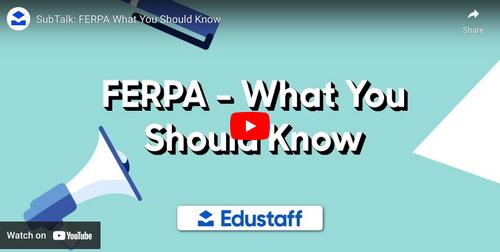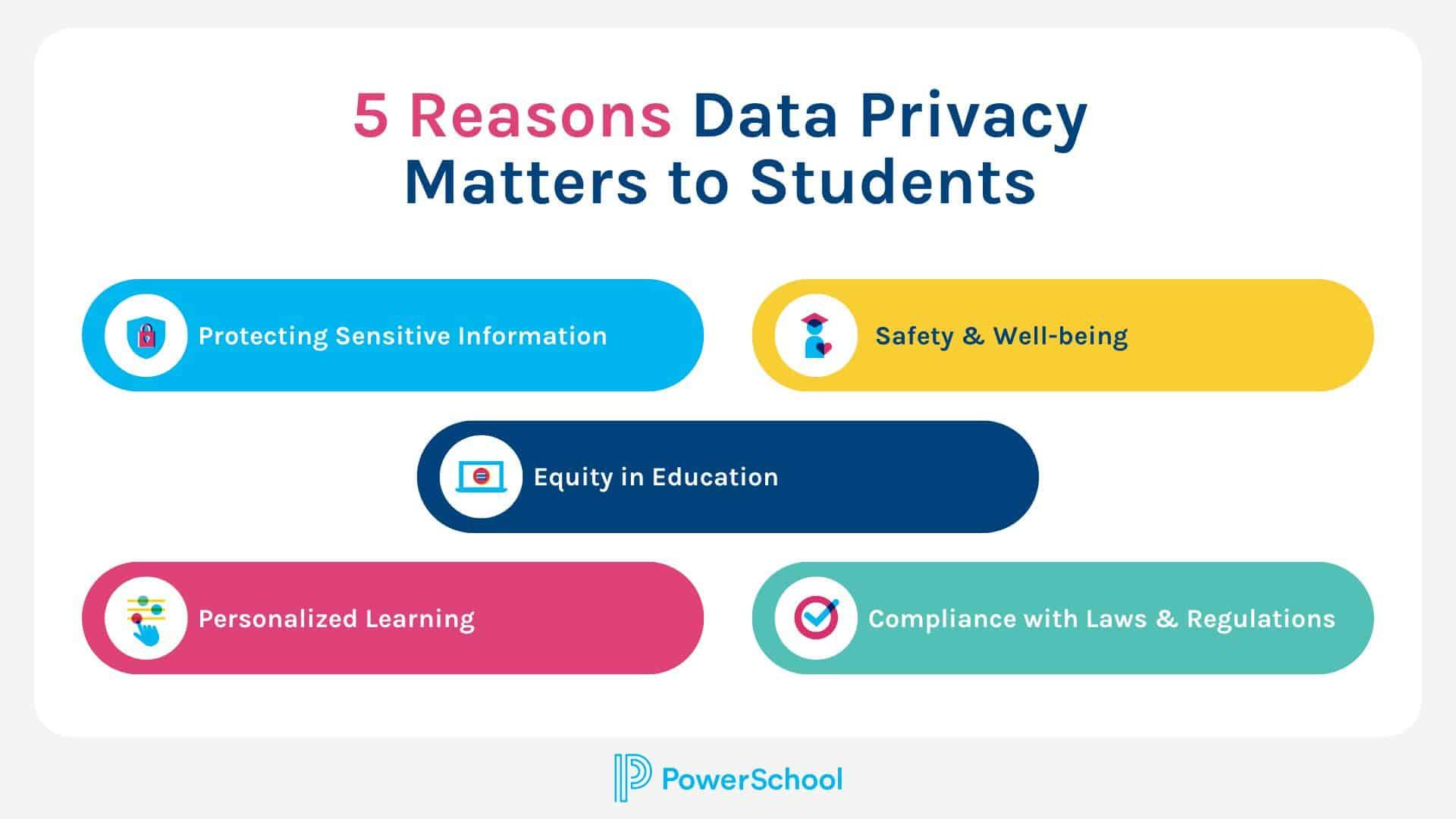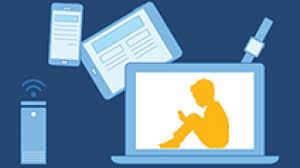Whatisstudent dataprivacy?
Student data privacy relates to responsible use, collection, sharing and protection of student data Student data can consist of their name, age, demographics, their educational progress and other information that is needed when students are registered to schools. This information is important to protect because if it is shared somewhere unknown to students, parents, or teachers it can potentially put the students at risk. Student data needs to be protected to avoid any harm that may happen if the data is shared like reputational harm, loss of opportunity, a permanent record and multiple other consequences that can negatively impact a students future life.
Student data privacy can be beneficial in school so teachers can track their students progress and plan their lessons accordingly. It can also be used to assess education programs and curriculums to figure out what is or isn’t working for the school district It is important for schools to follow these laws since it is an ethical and equitable manner There is more value in complying with these laws not just to stay out of legal trouble, but to help students stay safe as they further their educational journey There are many laws that protect different aspects of students when online This ebook explores three common laws that impacts schools, teachers, and students
FamilyEducational RightsandPrivacy Act(FERPA)

What the law means and what it protects, an example of how it is used
FamilyEducational RightsandPrivacy Act
The Family Educational Rights and Privacy Act (FERPA) protects children enrolled on schools under the age of 18 from being shared Once they are 18 they can give or prevent the spread of their personal information
THE LAW
FERPA is a law that protects the privacy of student education records, it restricts educational institutions from disclosing personally identifiable information and education records of the students without written consent of the student, or their parents if they are minors.
HOW IT IS USED
Students and parents have the right to inspect and review a child's education records, request the correction of records through a hearing, and stop the release of personally identifiable information There are only rare occasions when schools are allowed to disclose information without consent like when transferring schools, in cases of health and safety emergencies and other emergent situations The only people that have access are school officials that work with the student, otherwise people who want to view the information need permission from the student or parent
VIDEO ABOUT FERPA

ProtectionofPupil Rights Amendment (PPRA)
What the law means and what it protects, an example of how it is used
ProtectionofPupilRightsAmendment
Protection of Pupil Rights Amendment also seen as PPRA regulates students participation in a survey, analysis, or evaluation funded by the U.S Department of Education.
Meaningofthelaw
Parents must be aware and allowed to review the survey before it is given to their child, and they should be given the chance to opt their child out of the survey if there are personal and sensitive subjects included PPRA also protects the collection of information from students by not allowing the information collected to be used for marketing purposes. The only reason the information should be used is to improve the school and their curriculum
THE LAW IN USE
PPRA protects surveys, evaluations, and analysis that relate to political affiliations, religious practices, and negative behaviors. Teachers should notify parents in advance if such a survey is scheduled to be conducted, and give them a chance to view what the child will be answering. The parent can use the information to determine whether or not they want their child to participate. Depending on the topics that they believe is too personal or isn’t valuable to their child

Children’sOnline PrivacyProtection Act(COPPA)
What the law means, who it is for, and how it is used
Children’sOnlinePrivacy ProtectionAct
The COPPA act is directed towards websites and tech companies that target children under the age of 13. If children are using the online tools the website must request parental consent before collecting information from kids. These websites are required to have a clear and comprehensive privacy policy, and keep the information they collect from kids confidential and secure Companies must verify parental consent and allow parents to opt their child out of data collection. The information that is protected is what comes from children not necessarily about them, if the information about a child is coming from their parents the law doesn’t cover that scenario
COPPA IN SCHOOLS

In regards to education, schools and teachers can grant COPPA consent only if it is for educational purposes, and the information that is collected from children can’t be used for commercial purposes Since they are giving consent on behalf of parents, schools should still check products and have an understanding about how students' data is collected and used Under this law teachers can provide consent without parental knowledge.
Children’sInternet ProtectionAct
What the law means, who it is for, and how it impacts schools and libraries
Children’sInternetProtectionAct
CIPA relates to schools or libraries that receive discounts for internet access or internal connections through the E-rate program CIPA requires that these environments provide appropriate content for children. Locations that are subject to CIPA have to certify that they follow the internet safety policy that includes technology protection measures. These procedures filter or block access to images that are obscene, child pornography, or harmful to minors this is in place to protect children while they are online In addition to the procedures above, schools also have to comply with monitoring the online activities of minors, and educate minors about appropriate online behavior, social networking, and cyberbullying awareness Once all of these places comply with the rules they can receive E-rate funding. This law ensures the safety of children while they are online in these areas It also holds the locations accountable and able to provide valuable resources to community members
CIPAinSchoolsandLibraries
Schools must comply with CIPA to prevent children from accessing obscene or harmful content while online. It prevents them from entering dangerous or unsafe websites that may be a risk to them Knowing they don’t have access to that kind of content allows teachers to know that the students are safe while online and can focus on the educational use of technology
LIBRARIES
Libraries have to comply with a series of rules and procedures to follow CIPA and receive funding for it. This law impacts what resources libraries may provide children depending on what they deem as safe or harmful If libraries rely on the E-rate program for discounts, not following the law may keep them from providing all the materials they need to be an effective resource for the community If they expect funding in order to support projects or events it will be valuable to them to maintain their CIPA status. Not having that funding could be detrimental to the library which could impact the community as a whole
CIPAandBookBanning
ABOUT BOOK BANS
CIPA relates to book banning because it is a type of censorship CIPA is directed towards protecting kids from being online, but book banning is used to prevent exposing kids to content that may be offensive or too mature for some children Not allowing certain books in libraries takes away the choice from children and their families from having the ability to read the book With CIPA being an online matter there isn’t an option given.
WHO CAN BAN BOOKS MY PERSONAL THOUGHTS
The U S government can engage in book bannings, but most bans come from a local scale and from school boards There are many groups that make local and state efforts to ban books based on the content. Anyone in the community can make efforts to ban a book Once a book is brought up to administrators it is up to them to decide whether or not the book gets banned in their area or state. It is likely that administrators want to avoid controversy and will likely side with the public if most people want the book banned. There is no set law, rules or rubric that deem a book as inappropriate; it is up for interpretation and is mostly about the kind of content people may not want their children exposed to. This can cause a lot of tension between groups of people and politics because some people want certain information to be taught, while others think it is unnecessary and don’t see it as beneficial to their child
I think that children should have access to what is appropriate for their age However if it is a controversial subject or topic that doesn’t mean it has to go away from everyone. If families don’t want their child to read something they don’t agree with then they should set that boundary with their child Others still should be able to make the choice for themselves and their own families so it should be available to them. If parents don’t want their child to read a particular book, that is their choice, but it shouldn’t be taken away from others. This will allow everyone to have access to the content they need and they can make the personal choice on whether or not they want to consume it
ImpactoftheLaws onTeachers
Differences between the laws. How it effects teachers and the resources used in a classroom
DIFFERENCES BEWEEN THE LAWS
Each law relates to a different use of online websites for educational purposes. Each law protects different aspects of children, their personal information, and their wellbeing The goal of these laws is to prevent children from being put into harmful situations that can negatively impact their future or their character. It keeps online websites safe for kids to use and keeps the companies accountable while providing educational services. It also keeps technology in areas that are made for children appropriate for them while avoiding harmful content.
INFLUENCE ON TEACHERS
FERPA, COPPA, and CIPA laws impact teachers and their lessons because it can determine what online resources teachers can implement. These laws only allow teachers to use websites that comply with all of these laws This means if a teacher needs a resource there is a limited selection because students may be under that age limit, or the website may violate some rules meaning students data is at risk This could be harmful to students so it is the teachers responsibility to figure out if the websites are reliable to also avoid legal trouble. As for FERPA, teachers have to hold themselves accountable and keep their students' information private When complying with COPPA teachers should check the age requirement of the website before allowing their students to log in. In schools CIPA limits the resources teachers can use in a building so teachers have to plan their lessons around the websites they have available. These laws change what students can use to help support their education.
PLATFORMS THAT DON’T COMPLY
Some platforms are blocked by schools because they don’t follow some of the data privacy laws. Some of the sites that aren’t allowed are social media sites like Tik Tok, and instagram These sites have age requirements since their target audience is considered young but the content within these apps can be harmful to students. There are also games like Roblox and Minecraft that are blocked from schools because they don’t comply but are also directed towards children YouTube is a site that teachers can use, but students shouldn’t log in or sign up for it in a school building. Teachers can still show their students content but the students can’t do the searching because that would be a violation. There are many sites that schools block to make sure that students don't have access to these websites while in the building in order to protect the student
References
https://edtechmagazine.com/k12/article/2022/04/understandingferpa-cipa-and-other-k-12-student-data-privacy-laws-perfcon
https://studentprivacycompass.org/resource/student-privacy-primer/
https://www.cdc.gov/phlp/publications/topic/ferpa.html
https://studentprivacycompass.org/wpcontent/uploads/2019/04/FPF-Policymakers-Guide-to-StudentPrivacy-Final.pdf
https://www.edweek.org/technology/coppa-and-schools-the-otherfederal-student-privacy-law-explained/2017/07
https://www.commonsense.org/education/articles/what-is-coppa
https://www.fcc.gov/consumers/guides/childrens-internet-protectionact
https://dftcommunications.com/internet-and-wi-fi/blockwebsites/#:~:text=The%20goal%20of%20these%20rules,schools%20s hould%20be%20wary%20of.
https://www.edweek.org/leadership/whos-behind-the-escalatingpush-to-ban-books-a-new-report-has-answers/2022/09
https://www.ala.org/news/press-releases/2024/03/american-libraryassociation-reports-record-number-unique-book-titles
https://www.youtube.com/watch?v=eIOmskTvp08
